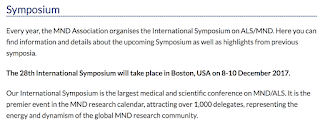
That was Dad's standard line whenever we got braggy at the dinner table or a sporting event or a school activity. Hubris was never a problem at our dinner table. Humility was valued by my parents' generation, and we learned lessons about the important distinction between arrogance and self-confidence.
Every time I go to an ALS fundraising event or a scientific meeting, Dad's words go through my mind.
"We have failed" does not make a good fundraising slogan or justification for the next big research grant. ALS events are celebrations of accomplishments that will give the public the confidence to invest. But, Dad's words ring true to me when I hear all the "accomplishments" and "promise."
We have failed. Individually and collectively, we have failed. Sure, progress has been made, but people are still dying from ALS, and the more we discover, the more complicated we realize the problem is.
The first time I went to an ALS walk many years ago, I followed a man who clearly had ALS. He struggled walking, but he walked. As I trailed him, I wondered what he had been doing a year before. Playing golf? Skiing? Running marathons? And I thought that it was unlikely that he would be at the walk the next year. That's a stark, ugly reality of ALS. That gentleman walking directly in front of me helped me understand that we really had failed him despite all the fundraising and balloons.
Some folks on the forum at als.net have been giving me grief about my encouraging people with ALS to apply for the fellowships for the International ALS MND Symposium in December. What difference does the symposium really make? What have all those scientific accomplishments that are celebrated every year really achieved? I understand what my friends there are saying. I understand 100%.
Sometimes it seems like scientists need my Dad to tell them to watch they don't break their arms patting themselves on the back.
People living the reality of ALS at the symposium could convey that, too, simply by their presence and participation. Their reality in the midst of the celebrating scientists could add a much-needed dose of realism and humility and perspective.
I think Dad would encourage them to be there.
https://alsmndpatientfellows.wordpress.com
 It's nearing time for the CDC's Annual ALS Registry Meeting (at least we think it is). You know the date for sure because you are the only organizations allowed to nominate participants for the meeting.
It's nearing time for the CDC's Annual ALS Registry Meeting (at least we think it is). You know the date for sure because you are the only organizations allowed to nominate participants for the meeting. 


